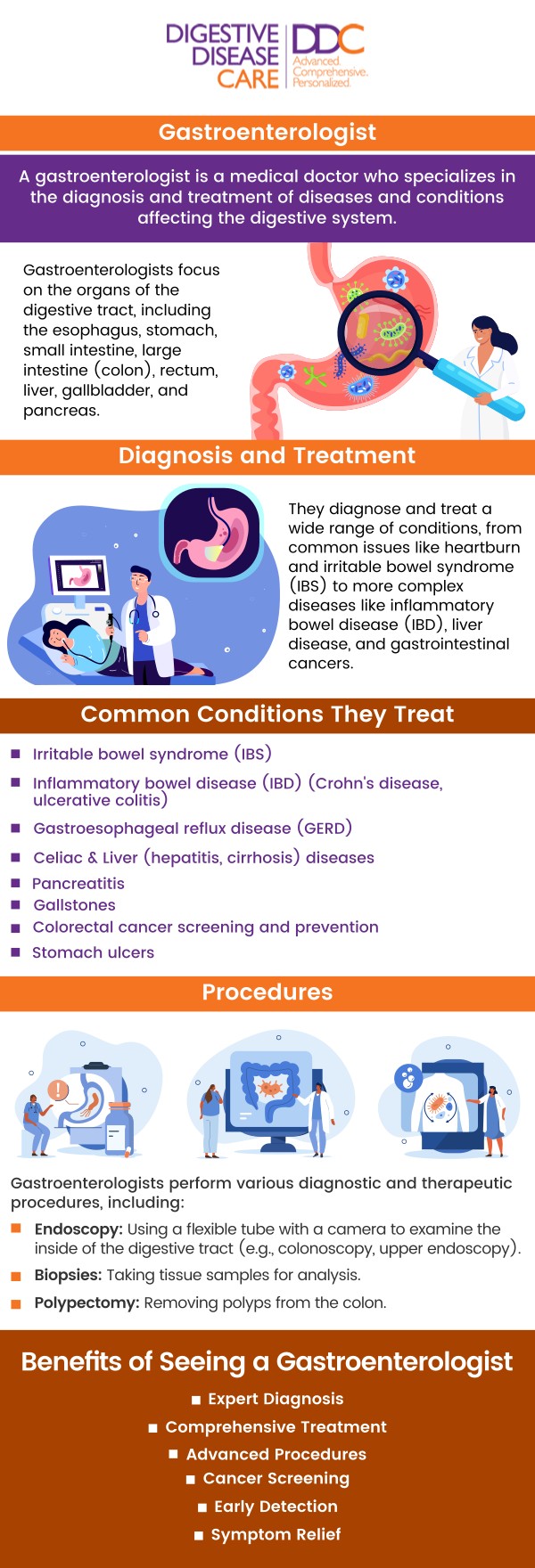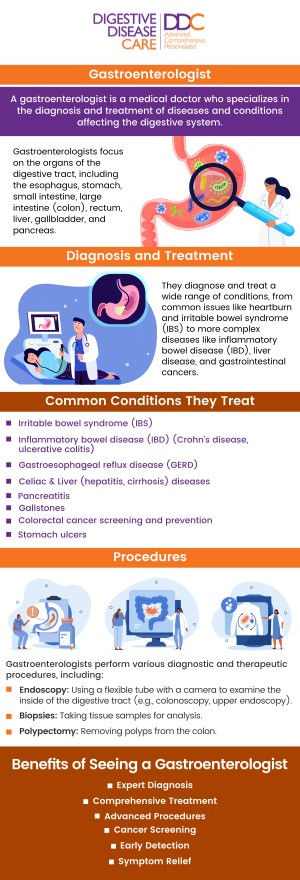Top Board-Certified Gastroenterologist in Jericho, NY
At Digestive Disease Care (DDC) in Jericho, NY, we have a team of top board-certified gastroenterologists committed to delivering exceptional digestive health care. Our expert provides personalized treatment plans tailored to meet your specific needs, ensuring you receive the highest level of care in a compassionate and comfortable setting. Whether you need advanced diagnostic services or routine care, DDC is your trusted partner for maintaining optimal digestive health. For more information, contact us today or book an appointment online. We are conveniently located at 366 N Broadway Suite LW-2-B, Jericho, NY 11753.




Table of Contents:
When should I be worried about stomach issues?
What distinguishes a GI doctor from a gastroenterologist?
What should you expect during your initial visit to a gastroenterologist?
How are gastrointestinal infections treated?
Digestive issues are a common occurrence and can range from minor discomforts to severe conditions requiring immediate medical intervention. While these issues often resolve on their own within a few days, there are certain times when they can indicate a more serious problem and warrant medical attention.
You should consider scheduling an appointment at Digestive Disease Care in Jericho NY if you experience the following symptoms:
• Persistent or Severe Pain: If your stomach pain is so severe that you can’t sit still or find a comfortable position, or if it continues for a week or more, it is important to seek immediate medical help. This could indicate an issue like appendicitis, a stomach ulcer, or conditions like gastritis or even stomach cancer.
• Accompanying Symptoms: Fever, chills, nausea, persistent vomiting or vomiting blood, diarrhea, or blood in your stool or dark, tarry stools can indicate an underlying infection, inflammation, bleeding, or ulcer in your stomach or intestines.
• Change in Bowel Habits: Sudden diarrhea or constipation, changes in stool color or consistency, or difficulty passing stool may be signs of digestive disorders or intestinal blockages.
• Unexplained Weight Loss: Sudden, unexplained weight loss along with stomach issues could be a symptom of serious health conditions, including malabsorption syndromes or cancer.
• Difficulty Swallowing or Chest Pain: Pain or discomfort while swallowing could be due to a problem in your esophagus or stomach, or a burning sensation in the chest, which may indicate gastroesophageal reflux disease (GERD) or other esophageal problems. These symptoms should never be overlooked and require immediate medical attention.
• Jaundice: Yellowing of the skin or eyes can be caused by liver disease, which requires immediate medical attention.
• Abdominal Swelling or Mass: A noticeable lump or swelling in the abdomen may indicate an underlying cyst, tumor, or infection.
• Sudden Onset of Symptoms: Rapidly developing stomach issues, especially if accompanied by severe pain, vomiting, or fever, may require urgent medical care.
Although stomach issues are often harmless, it’s crucial to pay attention to your body and seek medical care if symptoms persist or become severe. Early diagnosis and treatment of gastrointestinal issues can prevent complications, ensure optimal recovery, and improve overall well-being. Regular check-ups and screenings are also helpful in detecting any potential issues early.
We understand that the term “GI Doctor” can sometimes be used to refer to any medical professional who deals with GI issues. However, our team consists of board-certified gastroenterologists who have undergone extensive education and training.
Our gastroenterologists not only focus on treating diseases that affect the gastrointestinal tract and liver, but they also perform endoscopic procedures such as colonoscopies and endoscopies. We also offer preventive care for these organs, including endoscopic screenings.
Our team of experienced and board-certified gastroenterologists will initially focus on understanding your medical history, including any past surgeries, medications, major illnesses, and symptoms. This typically includes questions about your diet, lifestyle, and medical history to help pinpoint the cause of your symptoms. A physical examination may follow, where they check your abdomen for tenderness, bloating, or other issues. Additionally, we might assess your skin for signs of liver disease and monitor your weight and vital signs.
Following the initial examination, our gastroenterologists may recommend further diagnostic tests. These could range from blood tests to assess liver function, inflammation markers, and nutritional status, stool tests to detect infections, parasites, or blood in the stool, to more complex procedures like an endoscopy, colonoscopy, or imaging studies such as X-rays, ultrasound, or CT scans, depending on your symptoms. We make sure to thoroughly explain the procedure, detailing what you can expect before, during, and after the test, along with any potential risks.
Once the diagnostic tests are complete, our gastroenterologists will discuss the results with you and propose a treatment plan. This plan could involve medication, lifestyle changes, or in some cases, surgery. We make sure to explain the benefits and risks of each treatment and work closely with you to tailor a plan that meets your specific needs. Our goal is to manage or eliminate your symptoms and improve your digestive health.
A follow-up appointment will be scheduled to monitor your progress, adjust treatment as needed, and ensure ongoing management of your digestive health. The frequency of follow-up visits will vary based on your condition and the prescribed treatment plan.
To optimize your initial consultation, it’s important to gather and bring your medical records, note down any specific symptoms you are experiencing, including duration and severity, prepare a list of medications, supplements, and herbal remedies you are taking, and consider keeping a food diary to track your dietary habits.
In cases of milder infections, we recommend rest, adequate hydration, and over-the-counter medications. We also provide dietary advice, suggesting foods that are easy on your digestive system and helping you avoid potential irritants.
For more severe infections, our team is equipped to provide medical intervention. This may include intravenous fluid administration to correct severe dehydration and restore electrolyte balance. If necessary, we can prescribe antibiotics or antiparasitic drugs to combat bacterial or parasitic infections. We take care to use antibiotics judiciously to avoid contributing to antibiotic resistance.
We also conduct further investigations for cases where gastrointestinal infections may be indicative of a more serious condition, such as inflammatory bowel disease or stomach cancer. If your symptoms persist despite treatment, we urge you to seek immediate medical attention.
Prevention is a crucial part of our approach to managing gastrointestinal infections. We provide advice on good hygiene practices, and proper food handling, and discuss the possibility of vaccines for certain types of gastrointestinal infections, such as rotavirus and cholera.
Your health is our top priority. Consult with our healthcare professionals at Digestive Disease Care for proper diagnosis and treatment of gastrointestinal infections. We’re dedicated to helping you maintain a healthy digestive system. We have convenient locations to serve you in Melville NY, New Hyde Park NY, Forest Hills NY, Jericho NY, Mineola NY, Lake Success NY, Babylon NY, East Setauket NY, Massapequa NY, Riverhead NY and BEYOND.

Check Out Our 5 Star Reviews


Additional Services You May Like

Additional Services You May Like
- Abdominal Pain
- Acid Reflux
- Barretts Esophagus
- Bloating
- Capsule Endoscopy
- Celiac Disease
- Colon Cancer Screening
- Colonoscopy
- Constipation
- Crohns Disease
- Diarrhea
- Diverticulitis
- Esophageal PH Monitoring
- Fatty Liver
- Fibroscan
- Gallstones
- Gastroenterologist
- Gastric Chest Pain
- Gluten Intolerance
- Hemorrhoid
- Hemorrhoid Banding
- Hepatitis
- Irritable Bowel Syndrome
- Lactose Intolerance
- Pancreatitis
- Polyps
- Rectal Bleeding
- Stomach
- Ulcerative Colitis
- GI Urgent Care





